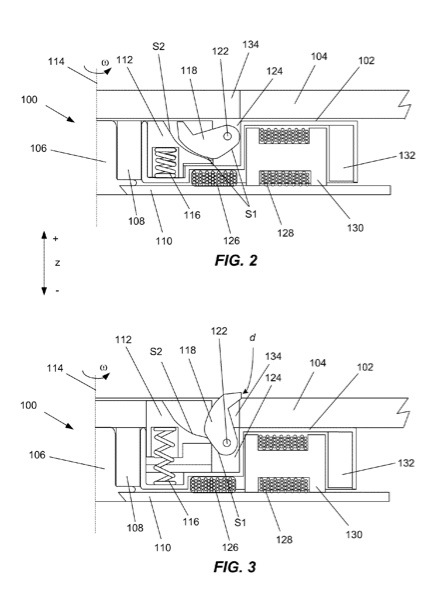An Apple patent (number 8132197) for mounting objects on a turntable has turned up at the U.S. Patent & Trademark Office. It relates relate generally to computing systems and more particularly to an optical disc drive (ODD) and shows that Apple wants to make such drives smaller in its Macs — assuming, of course, it does do away with them completely anytime soon.
The embodiments in the patent describe an apparatus and method for a reduced Z stack slot loading optical disc drive (ODD). In one embodiment, an optical disc mounting assembly can be used to chuck an optical disc to a turntable. The optical disc mounting assembly can include a hub spring for spring loading a hub and a clamping mechanism pivotally connected to the hub.
In the described embodiment, in an extended position, the clamp is used to secure the optical disc to the turntable. The clamping mechanism can include a clamp pivotally attached to the hub at a pivot point. In the absence of the optical disc, the clamp is retracted and secured within a recess in the optical disc mounting assembly. In the presence of the optical disc, the mounting assembly chucks the optical disc to the turntable using the clamp and hub. Paul J. Wehrenberg is the inventor.
Here’s Apple’s background on the invention: “In many cases it is necessary to mount objects onto a turntable. For example, many electronic devices contain an optical disc drive (ODD) for the purpose of reading and writing optical discs. Especially in the design of portable computers and electronic devices, there is a high value placed on reduction of size and weight. Conventional optical disc drives rely upon a coaxial hub/turntable/rotation motor combination that moves substantially along the axis of rotation (the `z` direction) in one direction to allow the optical disc to be inserted and placed on the turntable.
“In order to secure the optical disc, the coaxial hub/turntable/rotation motor combination must then move in the other direction. This up and down movement in the z direction can substantially add to the overall height (also referred to as the Z stack) of the ODD limiting the potential to reduce the size and/or weight of the ODD and ultimately the electronic device in which the ODD is used.”

